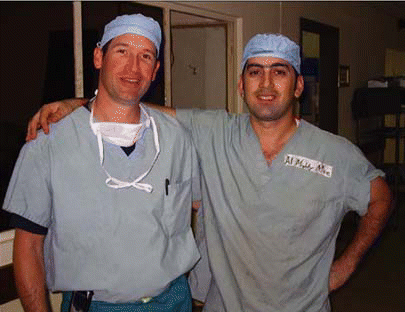
Explore This Issue
May 2007Although the US services issue earplugs to troops, they are not as effective as they should be, he says. Dr. Hoffer would like to see the type of hearing protection afforded industrial workers. But there is always a tradeoff between hearing protection and communication, which is so vital in wartime.
Rear Admiral Henry Falk, MD, MPH, of the US Centers for Disease Control and Prevention, who was involved in aiding victims of the 9/11 attacks, says the injured sometimes can’t hear questions and instructions from first responders. “Unlike those with previous hearing impairment, they don’t know how to deal with their communication problems,” he observed.
Injuries from Terror Attacks
Terror attacks in closed spaces result in injuries different from those seen on the battlefield. Avishay Golz, MD, head of otolaryngology and a member of the Trauma Unit at Rambam Medical Center in Haifa, Israel, has treated victims of blasts in restaurants and buses. “The pressure waves were tremendous; 95 percent required ear treatment,” he noted.
G. Richard Holt, MD (see sidebar, p. 13), who was deployed to Gulf War I as an otolaryngologist and to Iraq recently as a combat aviation brigade surgeon, has seen the dire results of blasts and overpressure exceeding 200 dB, including permanent inner ear damage and fractured ossicles. “Even how the head is turned can make a difference in injury to the facial nerve at the cheek,” he said.
Another problem is inhalation injury. The US Navy first reported on it as a major cause of mortality/ morbidity in the bombing of the USS Cole. The recent use of chlorine gas in Iraq has raised popular alarm. Chlorine is meant mainly to terrorize; it was ineffective as a weapon even when first used in World War I. Although chlorine can cause burns, and even fatal airway edema, it is easily detectable, and, being water-soluble, can be neutralized by as little as a wet handkerchief held to the face. (Deaths and serious injuries in recent attacks involving chlorine gas were caused by the blasts of IEDs.)
Among the most serious wounds of battle and terror are those to the neck. When breathing is compromised by tracheal perforation, edema, or aspiration of foreign material, tracheotomy must be performed as soon as possible, because prolonged intubation causes additional trauma. “All my residents can do trachs with one hand tied behind their backs,” said Dr. Golz.
Leave a Reply